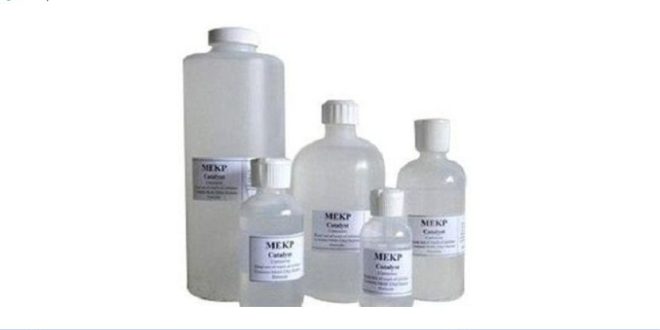Introduction
Methyl Ethyl Ketone Peroxide (MEKP) is a highly reactive chemical compound used primarily as a catalyst in the polymerization process of unsaturated polyester resins. MEKP plays a vital role in the production of various end products, including fiberglass, composite materials, and reinforced plastics. The demand for MEKP is growing across industries like automotive, construction, and aerospace, where advanced composites and durable materials are essential. Establishing a Methyl Ethyl Ketone Peroxide Manufacturing Plant requires a detailed understanding of its production process, safety measures, equipment requirements, and market potential. This Methyl Ethyl Ketone Peroxide Manufacturing Plant Project Report will provide an in-depth look into the steps involved in setting up a MEKP manufacturing facility.
What is Methyl Ethyl Ketone Peroxide (MEKP)?
Methyl Ethyl Ketone Peroxide (MEKP) is an organic peroxide compound formed by the reaction between methyl ethyl ketone (MEK) and hydrogen peroxide (H₂O₂). It exists in liquid form and is primarily used as a hardening or curing agent in the production of composite materials. MEKP is widely used as an initiator in the polymerization of unsaturated polyester resins, making it essential in manufacturing products like:
- Fiberglass composites
- Reinforced plastics
- Aerospace parts
- Automotive parts
- Construction materials
The compound itself is unstable and requires careful handling, making the setup of an MEKP manufacturing plant a complex but profitable venture.
Applications of Methyl Ethyl Ketone Peroxide
MEKP has several important applications across different industries due to its catalytic and curing properties:
1. Polymerization of Resins
MEKP is primarily used as a catalyst in the polymerization of unsaturated polyester resins. These resins are used to manufacture a wide range of products, including fiberglass, composite materials, and coatings. The automotive, marine, construction, and aerospace industries are among the primary consumers of these resins.
2. Fiber Reinforced Composites
In the production of fiber-reinforced composites, MEKP is used to initiate the curing process. The compound helps create durable, lightweight materials that are widely used in industries requiring high-strength components, such as aerospace, automotive, and marine manufacturing.
3. Paints and Coatings
MEKP is also used in the production of paints and coatings. As a hardener, it enables the creation of durable finishes that can withstand harsh environmental conditions. This application is particularly important in the automotive and marine industries, where long-lasting protective coatings are crucial.
4. Surface Coatings and Moldings
MEKP is used in the production of molds and surface coatings, particularly in industries that deal with complex shapes and patterns. The hardening properties of MEKP help create materials that are resistant to abrasion and wear, making it essential for mold-making and surface finishing in a variety of applications.
5. Adhesives
MEKP is an ingredient in certain types of structural adhesives. These adhesives are used in industries such as construction and automotive, where the adhesive needs to provide a strong and durable bond under stress.
Production Process of Methyl Ethyl Ketone Peroxide
The manufacturing process for Methyl Ethyl Ketone Peroxide involves a reaction between methyl ethyl ketone (MEK) and hydrogen peroxide (H₂O₂) in the presence of a solvent. The reaction is highly exothermic and must be carefully controlled. Below is a breakdown of the typical production process:
1. Reaction of MEK with Hydrogen Peroxide
The first step involves mixing methyl ethyl ketone (MEK) with hydrogen peroxide. The reaction produces Methyl Ethyl Ketone Peroxide (MEKP), as well as some by-products that must be removed. The reaction is exothermic, which means that heat is released during the process.
2. Temperature and Pressure Control
The reaction takes place at controlled temperatures and pressures to ensure that MEKP is produced in the desired concentration and purity. Since MEKP is highly reactive and unstable, precise temperature control is critical. Typically, the reaction occurs at a temperature of 20-30°C, with the mixture being carefully monitored to prevent any hazardous situations.
3. Separation and Purification
After the reaction, the mixture contains several impurities such as unreacted hydrogen peroxide, by-products, and solvents. Separation methods, including distillation and filtration, are used to isolate the MEKP and remove the unwanted substances.
The resulting MEKP must be of high purity to ensure that it functions effectively as a catalyst in industrial applications.
4. Stabilization and Storage
Once the MEKP has been purified, it is stabilized using stabilizing agents to prevent decomposition. It is then stored in special containers designed to handle organic peroxides. Proper storage is critical as MEKP is highly sensitive to light, heat, and contamination, which can cause it to decompose.
MEKP is typically stored in cool, dry conditions and needs to be kept in air-tight containers to avoid exposure to moisture and air, both of which can reduce its shelf life.
Infrastructure and Equipment Requirements
Setting up a Methyl Ethyl Ketone Peroxide Manufacturing Plant requires specialized infrastructure and equipment due to the chemical’s reactive and hazardous nature. The following key infrastructure components are needed:
1. Raw Material Storage
Raw materials like MEK and hydrogen peroxide must be stored safely in dedicated storage tanks. These raw materials are volatile and reactive, so storage areas should be well-ventilated and equipped with safety mechanisms, including spill containment systems.
2. Reaction Vessels
The core of the MEKP manufacturing process is the reaction vessel where MEK and hydrogen peroxide are combined. These vessels must be designed to withstand the high temperatures and pressures that occur during the reaction. Materials used for these vessels should be resistant to corrosion, typically stainless steel or titanium.
3. Distillation Columns
To separate and purify the MEKP, distillation columns are essential. These columns separate the MEKP from other by-products based on differences in boiling points. The distillation process must be carefully controlled to ensure the purity and quality of the final product.
4. Safety and Ventilation Systems
Given the hazardous nature of MEKP, a robust safety system is crucial for the plant’s operation. This includes ventilation systems, gas detectors, and fire suppression systems. The plant must also be equipped with proper personal protective equipment (PPE) for workers and emergency response protocols in case of spills, leaks, or accidents.
5. Storage and Packaging
Once produced and purified, MEKP is stored in specialized containers designed to handle its reactive nature. These containers must be tightly sealed and resistant to degradation over time. For distribution, the MEKP is packaged in small quantities and shipped to customers in air-tight containers.
Market Demand and Financial Considerations
The demand for Methyl Ethyl Ketone Peroxide is expected to grow as industries such as automotive, aerospace, and construction increasingly rely on composite materials. Additionally, MEKP’s use in fiberglass production and the manufacture of reinforced plastics contributes to its growing popularity.
1. Market Demand
- Automotive: The automotive industry is a major consumer of MEKP, as it is used in the production of fiberglass and composite parts for vehicles.
- Aerospace: MEKP is used in the production of lightweight composite materials for aircraft and spacecraft.
- Construction: The growing use of reinforced plastics in construction applications further drives demand for MEKP.
- Marine: The marine industry uses MEKP in the production of fiberglass-reinforced hulls and other components.
2. Investment and Cost Considerations
The setup costs for a MEKP manufacturing plant are relatively high due to the specialized equipment required, such as reaction vessels, distillation columns, and safety systems. Additionally, ongoing costs will include the procurement of raw materials, utilities, labor, and maintenance.
However, the potential revenue from selling MEKP to key industries such as automotive, aerospace, and construction provides significant opportunities for profitability. The market for MEKP is expanding due to the rising demand for composite materials and high-performance plastics.
FAQs
1. What is Methyl Ethyl Ketone Peroxide (MEKP)?
MEKP is an organic peroxide compound used primarily as a catalyst for the polymerization of unsaturated polyester resins, commonly used in manufacturing fiberglass and reinforced plastics.
2. What industries use MEKP?
MEKP is used in the automotive, aerospace, construction, and marine industries, as well as in the production of fiberglass, composites, and reinforced plastics.
3. What safety measures are required for handling MEKP?
MEKP is highly reactive and hazardous. Safety measures should include proper ventilation, PPE for workers, spill containment, and fire suppression systems to mitigate the risks associated with its handling and storage.
4. What is the production process of MEKP?
The production of MEKP involves the reaction between methyl ethyl ketone (MEK) and hydrogen peroxide, followed by distillation, purification, and stabilization of the final product.
5. What are the main applications of MEKP?
MEKP is used in the production of fiber-reinforced composites, adhesives, coatings, and molding agents, particularly in industries requiring high-performance materials.
Media Contact:
Company Name: Claight Corporation
Contact Person: Lewis Fernandas, Corporate Sales Specialist — U.S.A.
Email: sales@expertmarketresearch.com
Toll Free Number: +1–415–325–5166 | +44–702–402–5790
Address: 30 North Gould Street, Sheridan, WY 82801, USA
Website: www.expertmarketresearch.com
Aus Site: https://www.expertmarketresearch.com.au
 Crypto trade Online Unlock the Future of Finance Today.
Crypto trade Online Unlock the Future of Finance Today.




